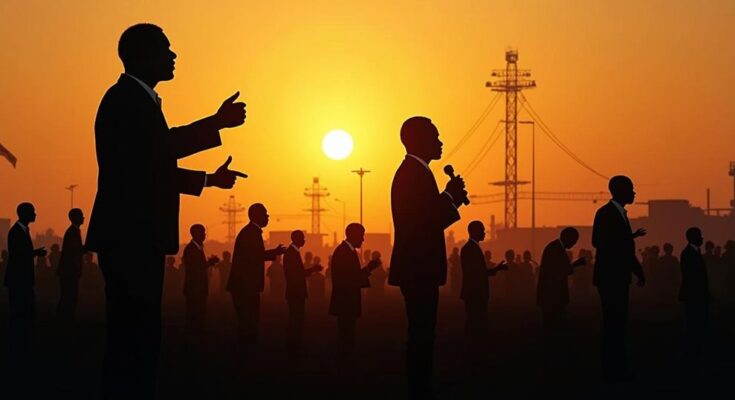Mozambique’s presidential elections on Wednesday signal a significant political shift as the ruling Frelimo party fields Daniel Chapo, a candidate new to leadership roles, in light of widespread corruption dissatisfaction. Amid a backdrop of opposition from Venâncio Mondlane and Ossufo Momade, analysts regard the election as unpredictable, fraught with potential electoral malpractice and pressing socio-economic challenges.
Mozambique is poised for a significant shift in its political landscape as the upcoming presidential elections mark the end of an era dominated by leaders from the independence movement against Portuguese colonial rule. This election features Daniel Chapo, a 47-year-old candidate from the ruling Frelimo party, who represents a new generation born after the country’s independence in 1975. As Frelimo campaigns to extend its long-standing governance, it faces waning public support due to discontent over corruption, exemplified by the “tuna bond” scandal that plunged the nation into economic turmoil. In contrast, Chapo positions himself as a refreshing alternative, enjoying enthusiastic support at campaign rallies as he seeks to dissociate himself from party corruption. Lyrics from one of his campaign songs emphasize his image: “Brother Dan is honesty in person… He is the voice of hope we want to embrace… It’s time for change.” However, skepticism remains regarding Chapo’s capacity to instigate real change given his association with a party long accused of corruption. Critics point out that Frelimo’s political tactics may include fraudulent voter registration practices, with NGOs identifying potential “ghost voters”—individuals listed on the voter rolls who do not exist. Recent reports suggest nearly 900,000 fake names may be included in the voter registry, potentially skewing the election results in Frelimo’s favor. Chapo is contending not only with historical apprehensions but also with formidable rivals, including Venâncio Mondlane, a fresh face in the political arena and former Renamo member, who is also appealing to youth voters with his slogan, “Save Mozambique – this country is ours.” Alongside Mondlane, Ossufo Momade of Renamo poses an additional threat after previously leading the party and attempting to challenge the current president Filip Nyusi during the last elections. While the recent violence in Cabo Delgado linked to jihadist insurgencies looms in the background, it remains less emphasized in the electoral discourse. Nonetheless, the overarching concern for Mozambique remains the widespread poverty faced by the majority of its population. The prospect of economic improvement and job creation will undoubtedly challenge the incoming leadership. With the election results deemed unpredictable, analysts express caution, noting that the landscape remains fluid as the candidates finalize their campaigns. Political commentator Charles Mangwiro reflects on this uncertainty, stating, “It’s too close to call.”
The political climate in Mozambique is witnessing pivotal changes as long-standing leaders from the independence struggle make way for new candidates in the upcoming elections. The Frelimo party, which has governed since the nation achieved independence in 1975, is influenced by growing public dissatisfaction stemming from corruption allegations and a severe economic crisis. Against this backdrop, the electoral landscape features Daniel Chapo as Frelimo’s candidate, alongside competitors from the opposition aiming to capitalize on the discontent with traditional political dynamics. This election represents not just a contest for the presidency, but a broader fight to redefine Mozambique’s political future and address pressing societal issues, including poverty and corruption.
The upcoming elections in Mozambique signify a critical juncture as the nation prepares to transition from an independence-era political leadership to newer figures like Daniel Chapo and Venâncio Mondlane. With corruption and economic woes at the forefront of public sentiment, the elections will serve as a litmus test for the potential of genuine political renewal. The atmosphere remains charged with uncertainty, and the outcome is likely to have far-reaching implications for the country’s governance and socio-economic development.
Original Source: www.bbc.com




